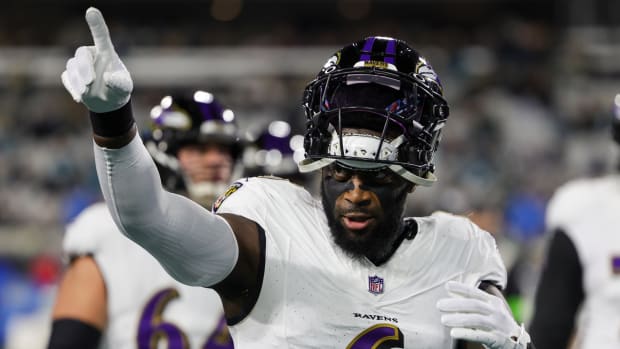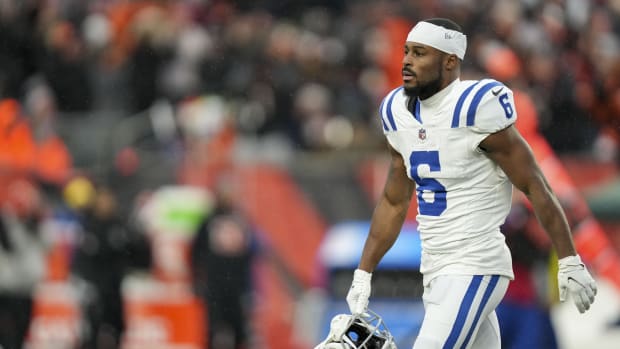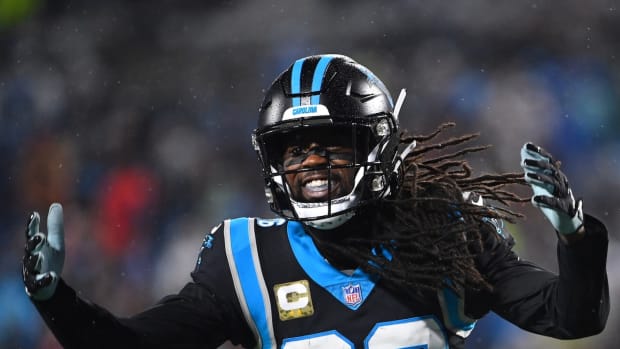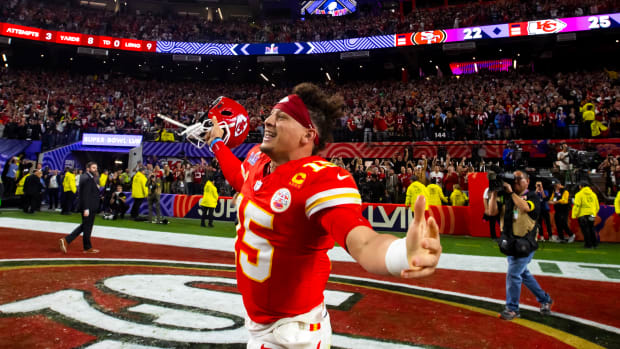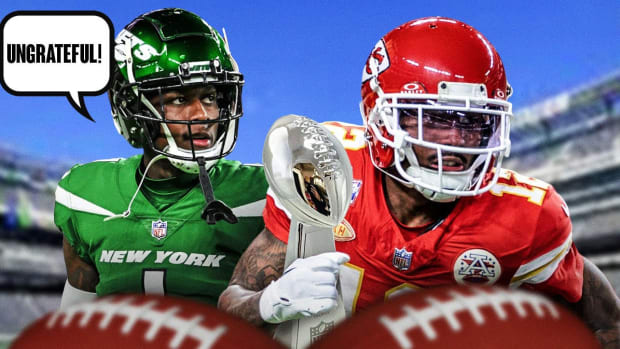Marcus Ball: Was I Cut by the Panthers for Making a Gesture During the Anthem?
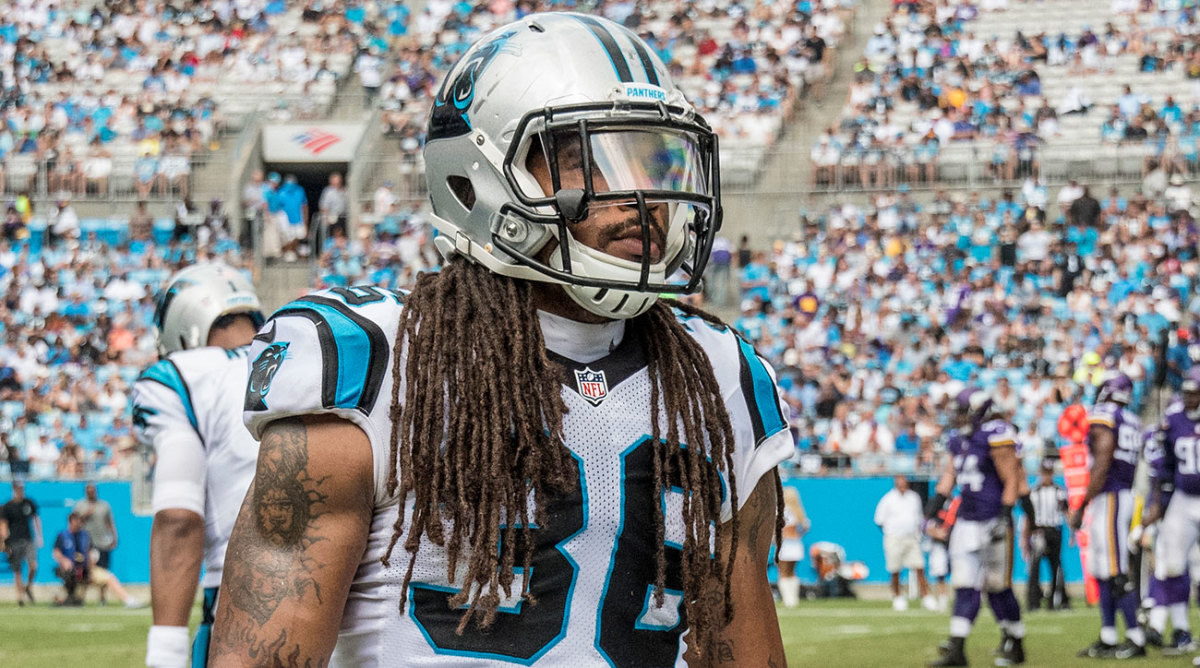
I missed the call and didn’t think much of it. It was the last Tuesday in September of 2016. Two days before that—and after more than a year on the practice squad—I had just dressed for my first game for the Carolina Panthers. We lost to the Minnesota Vikings at home. But I was thrilled to have earned my right to be on the active roster.
The missed call came from the Panthers offices, which wasn’t unusual. I knew so many people there—teammates and coaches, but also regular folks in the offices— on a first-name basis. This call, though, wasn’t social. It wasn’t one of my position coaches either. There was no voicemail, but then I got a text from the same number. I was summoned to the office and told to bring my playbook.
Football is a business. We all know that. Especially guys on the practice squad. But this seemed strange. I had just been promoted and dressed for my first game. And I hadn’t done anything that anyone would consider wrong. At least not during the game.
Before kickoff, they played the national anthem, as they always do. I stood. I honored the flag. I prayed. I sang. But I also acknowledged the protests and recent events that had been building around the country and recently in Charlotte. (That very week, a black man had been fatally shot by a police officer in the city.) During the anthem, I made a gesture, holding up my right hand with my index finger pointing toward the sky to God. I didn’t realize it, but I was the only guy on the team to make any sort of gesture that day. There was nothing organized; I didn’t discuss anything with anyone. It was just in my heart that day to thank God for the opportunity and to reflect on the excitement that had built up inside me. Maybe I was extra emotional that day, dressing for the first time for a city and team I learned to love. My family was there on a beautiful Sunday afternoon. Asked about it after the game, I had a two-word answer. “One love,” quoting the late Bob Marley. My point: It was a time in the country where I believed we needed unity, where we all needed to come together as one in the culture, and in the country. I figured to use the opportunity to symbolize and express my feelings, to show that unity is strength.
Being portrayed as an African-American man in America, I was raised by a single white mother. I was taught the importance of how to love and respect all people equally. I had no intentions of protesting or even attempting to look as though I was doing so. I stand behind any player who demonstrates or acts on what they believe in. We are humans first. But when the incident in Charlotte happened it really hit close to home for me.
I walked into the facility, walked upstairs and, as I expected, I was told I was being released and my contract was being terminated. I questioned the motives immediately. I had put in a lot of work for the organization, and now I was being abruptly released? “Why? What did I do?” I asked. I didn’t get much of an answer.
I then had to ask: “Am I getting released by Big Cat?” I asked, referring to our owner, Jerry Richardson.
“Oh, no, no, no,” I was told.
I had my doubts. I know Richardson didn’t want players following Colin Kaepernick’s lead and protesting. I knew he didn’t want players wearing dreadlocks, which I did. Same for sporting tattoos. But what could I do? I was a practice squad player. On my level, you don’t challenge the Boss Man.
I was re-signed to the Panthers’ practice squad, perhaps to cover up the fact that I was released only three days after finally being activated. I went on to finish out the season with the San Francisco 49ers. I spent this past 2017 season in the Canadian Football League, playing for the Toronto Argonauts and have anchored two Grey Cup Championships in three of my four total seasons.
My suspicions about my release from the Carolina Panthers came roaring back last month when I read the allegations against Jerry Richardson. The Sports Illustrated story mentioned an African-American scout who left the team after Richardson used a racial slur. All this is coming out, and I know I’m not the only one saying “Told you so.”
I know people were upset when Cam Newton seemed to defend Jerry Richardson. That didn’t upset me. I’m good friends with Cam (and, as a observer, he’s always been one of my favorite NFL players). I don’t judge him. But you know what does upset me? Cam Newton is getting asked that question—and he has to sit there and answer it—while Jerry Richardson hasn’t said a word. He hasn’t defended himself. He hasn’t apologized. He hasn’t had to address anyone. The players have to be accountable, left to answer for men with suits and ties on. I have the world of respect and love for the coaches and especially the players. The guys in the locker room stick with you for the rest of your life.
We know that if even if Jerry Richardson sells the team immediately, the NFL investigation continues. Which it should. A lot of people have their questions, and they deserve answers. But I do, too. I feel like I was screwed out of a job, a career and my lifelong dream, because … why? The owner doesn’t want a black player raising a finger? I know he’s the boss. But is that fair?
I’ve thought about that every single day since then. Would I do it again? The answer is “yes.” One people, one love, one unity. Peace. I stand for that now, more than ever. It’s a shame that clearly, not everyone feels the same.
Marcus Ball has played for the Saints, Panthers and 49ers. He has won two Grey Cups with the Toronto Argonauts.
Question or comment? Email us at talkback@themmqb.com.

































